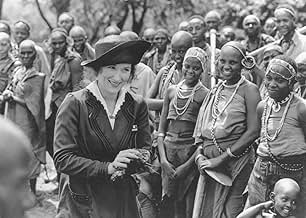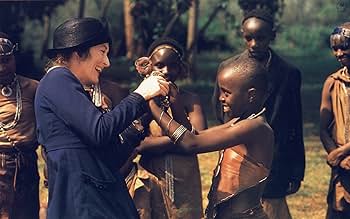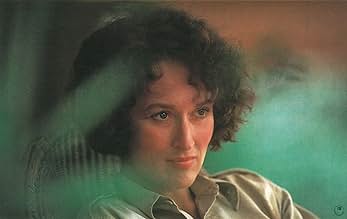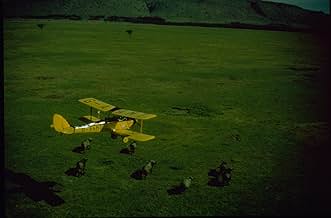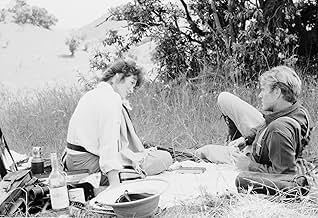En la Kenia colonial, una baronesa danesa propietaria de una plantación tiene una apasionada aventura con un cazador de espíritu libre.En la Kenia colonial, una baronesa danesa propietaria de una plantación tiene una apasionada aventura con un cazador de espíritu libre.En la Kenia colonial, una baronesa danesa propietaria de una plantación tiene una apasionada aventura con un cazador de espíritu libre.
- Dirección
- Guionistas
- Elenco
- Ganó 7 premios Óscar
- 30 premios ganados y 31 nominaciones en total
Opiniones destacadas
What a memorable gem of a movie!! I thought this film deserved every one of its seven Academy Awards it got. After viewing this film again I'm just stupefied why didn't Meryl Streep win Best Actress in this movie. The role of Karen Blixen was very complex and she performed it beautifully. This is probably right up there with "Sophie's Choice" and "Kramer vs. Kramer" both Award winning performances for her and this is right there with "Bridges of Madison County" and "A Cry in the Dark".
Syndey Pollock hit the nail right on the head with this classic beautiful cinematography. The acting is excellent by Streep, Redford, and Klaus Maria Brandeur. I liked the scene when Karen (Streep) wants her servant to address her by her name and he said "You are Karen, Sabu". I also loved the owl that she had in her room - it was a small one, but it was so cute and I loved it.
If you have a chance to rent this movie, please do - it is a classic. I love the beginning line "I had a farm in Africa" it was so moving!!
Syndey Pollock hit the nail right on the head with this classic beautiful cinematography. The acting is excellent by Streep, Redford, and Klaus Maria Brandeur. I liked the scene when Karen (Streep) wants her servant to address her by her name and he said "You are Karen, Sabu". I also loved the owl that she had in her room - it was a small one, but it was so cute and I loved it.
If you have a chance to rent this movie, please do - it is a classic. I love the beginning line "I had a farm in Africa" it was so moving!!
a film with Meryl Streep and Robert Redford could not be more than a good one. the African landscapes, the music, the cast are virtues in same measure. but the real surprise is the wise balance between emotions, love story, decisions of the lead characters. the science to use a book for explore the nuances of a form of survive far to well- known places. the precise - delicate portrait of relationship and about the status/roots in a different society. and, sure, the high poetry of images - parts of inspired music. a film for remind and discover. small, seductive, bitter details. and for understand a part from a non ordinary biography. more than a good film, a surprising one. for a kind of magic who rebuild a lost form of romanticism and adventure.
Wonderful film. Great in every detail. Director Sydney Pollack captures every nuance of time and place, and the cast is perfection. Meryl Streep is a total wonder as the Danish woman who goes to Africa to find a life but learns about love instead. Robert Redford was much maligned when this film was released in 1985 but now seems quite fine. Michael Kitchen, Rachel Kempson, Suzanna Hamilton, and Michael Gough are all good. John Barry's beautiful score is among the best in film history: a perfect melding of times past and wistfulness and love. Gorgeous African vistas serve as a backdrop for the love story between Streep and Redford, playing real-life characters Isaak Dineson and Dennis Finch-Hatton. But this is not just a movie romance. It's a story about loss: the loss of love, the loss on innocence, the loss beauty. And it's all symbolized by the loss of Africa. War, mechanization, imperialism, westernization, progress are the evils of the early 19th century just as they are today. But the heart of this film is Meryl Streep's flawless performance. She is a wonder.
My favorite movie of all time, hands down. I watched it for the first time in the theatre. As it ended, the audience sat motionless and quiet for several beats, then burst into loud applause as the ending credits rolled. I'm not always so prophetic, but I was incredibly moved. I said to my husband, "We've just seen the Academy Award winner." If I had no other basis for recommendation, I would say the breathtaking cinematography and transporting musical score would make a viewing worthwhile (case in point: the main theme playing as Denys Finch Hatton gives Karen Blixen her first airplane ride, and we what she sees, as God must have seen it). But these are merely the window dressings.
There are two movie cuts floating around, which I tried to pursue through Universal, and then Disney. Forget it. Suffice to say there is a theatrical version and a Disney TV version, with little consequential difference to the plot except that the latter edits out a little of Karen's physical lovemaking with Denys and slightly expands her intellectual relationship with Farah; which to some degree helped buttress the development of his absolute devotion to her.
The screenplay resembles Isaak Dinesen's semi-autobiographical book very little; even so, she did not tell the whole truth in her book. You'll have to get over it, except that I think the character development suffered the loss of Blixen's deep involvement with the displaced Kikuyu tribe working her coffee plantation. Also, without an understanding of the historical times, it would be too easy to say simplistically that this is a woman trying to live within the terms of a marriage of convenience and then compensating with pursuit of a doomed passion.
What was crafted out of a mishmash of a more-or-less factual account and director Sydney Pollack's vision is still a beautiful love and adventure story in the midst of British colonial rule and an earlier, more racially and sexually biased era.
Klaus Maria Brandauer as Baron Bror von Blixen (whew! - who called Karen "Tannen," adding to my initial confusion) perfectly portrays that fun man you like immensely but could never really trust with anything important like your feelings. He along with several of the key male figures and symbols in this movie will eventually bow in respect to the "man" Karen Blixen becomes despite his often shabby treatment and other travails, because she rises above it all and perseveres. Redford plays mostly Redford. His Finch Hatton's sense of independence is fragile and illusory and will ultimately cost him dearly.
There are a couple of continuity problems that bother me to this day, including the disappearing-reappearing champagne and the continually retracking parade marchers, but for the most part few expenses or attentions to detail were spared, especially in the lavish costuming. "Bare-breasted native women" will unfortunately also make their National Geographic appearance.
Even so, Out of Africa is a treasure with a half dozen or more perfect and unforgettable scenes; a movie as long as this review, but I hope you'll agree, worth your patience.
There are two movie cuts floating around, which I tried to pursue through Universal, and then Disney. Forget it. Suffice to say there is a theatrical version and a Disney TV version, with little consequential difference to the plot except that the latter edits out a little of Karen's physical lovemaking with Denys and slightly expands her intellectual relationship with Farah; which to some degree helped buttress the development of his absolute devotion to her.
The screenplay resembles Isaak Dinesen's semi-autobiographical book very little; even so, she did not tell the whole truth in her book. You'll have to get over it, except that I think the character development suffered the loss of Blixen's deep involvement with the displaced Kikuyu tribe working her coffee plantation. Also, without an understanding of the historical times, it would be too easy to say simplistically that this is a woman trying to live within the terms of a marriage of convenience and then compensating with pursuit of a doomed passion.
What was crafted out of a mishmash of a more-or-less factual account and director Sydney Pollack's vision is still a beautiful love and adventure story in the midst of British colonial rule and an earlier, more racially and sexually biased era.
Klaus Maria Brandauer as Baron Bror von Blixen (whew! - who called Karen "Tannen," adding to my initial confusion) perfectly portrays that fun man you like immensely but could never really trust with anything important like your feelings. He along with several of the key male figures and symbols in this movie will eventually bow in respect to the "man" Karen Blixen becomes despite his often shabby treatment and other travails, because she rises above it all and perseveres. Redford plays mostly Redford. His Finch Hatton's sense of independence is fragile and illusory and will ultimately cost him dearly.
There are a couple of continuity problems that bother me to this day, including the disappearing-reappearing champagne and the continually retracking parade marchers, but for the most part few expenses or attentions to detail were spared, especially in the lavish costuming. "Bare-breasted native women" will unfortunately also make their National Geographic appearance.
Even so, Out of Africa is a treasure with a half dozen or more perfect and unforgettable scenes; a movie as long as this review, but I hope you'll agree, worth your patience.
What makes a good film? It's funny I lent my DVD of this to a mate recently and although she didn't hate it she didn't get it either. Which surprised me because, to me, there has never been any doubt in my mind about the beauty and quality of this film. Anyway I was surfing IMDb and decided to look at this page. There is (or was) a thread on the discussion board about whether this was a good or bad film, I clicked on it. I have never (in my modest surfing of this site) seen such a big thread. Surely a film that evokes that much passion (the majority of which was positive and defencive) has achieved something.
I'm not saying that Out of Africa is the best film I've ever seen (I've yet to see that one!) but I think I can safely say that it has secured a place for itself both in cinematic history and the future of entertainment. You see at it heart it is a well made, timeless epic.
Yes there will always be the people who take exception to the accents, dislike the ending or believes it drags on for too long, but that's their lost, I can't help thinking they haven't been patient enough (and this annoys me).
You see the thing is in many ways the endless beauty of this film lies in its subtleties. Yes you have Meryl Streep and Redford flanked by the scenery and music, but for me it's the things like Pollock's direction, Michael Kitchen's performance and Karen's interaction with member's of the tribe that make the film.
Part of me wants to tie my mate to a chair and make her sit and watch this until she gets it. The other half is slightly relieved, because I feel that with her rejection this film is ever so slightly more exclusively mine, and I know that although I'm still only young I will always have time a space for it!
I'm not saying that Out of Africa is the best film I've ever seen (I've yet to see that one!) but I think I can safely say that it has secured a place for itself both in cinematic history and the future of entertainment. You see at it heart it is a well made, timeless epic.
Yes there will always be the people who take exception to the accents, dislike the ending or believes it drags on for too long, but that's their lost, I can't help thinking they haven't been patient enough (and this annoys me).
You see the thing is in many ways the endless beauty of this film lies in its subtleties. Yes you have Meryl Streep and Redford flanked by the scenery and music, but for me it's the things like Pollock's direction, Michael Kitchen's performance and Karen's interaction with member's of the tribe that make the film.
Part of me wants to tie my mate to a chair and make her sit and watch this until she gets it. The other half is slightly relieved, because I feel that with her rejection this film is ever so slightly more exclusively mine, and I know that although I'm still only young I will always have time a space for it!
Oscars Best Picture Winners, Ranked
Oscars Best Picture Winners, Ranked
See the complete list of Oscars Best Picture winners, ranked by IMDb ratings.
¿Sabías que…?
- TriviaEarly in the film, Baroness Karen Blixen is introduced to her servants. Although the scene is inter-cut with close-ups and other inserts in the film, the first take was filmed as one long shot that required Meryl Streep to meet and exchange dialogue with several other characters. As soon as director Sydney Pollack yelled "Cut", Streep, wearing a high-collared shirt and snug jacket, yelled "get this thing off of me!" and ripped open her jacket. A large beetle had crawled down the front of the jacket moments after the camera rolled, yet she continued filming the scene. Much of it remains in the final film.
- ErroresDuring the lion attack, Denys pulls an additional two spare cartridges from his belt as a ready reload. However, he carries them with his right hand, his trigger hand, which also is the hand needed to break the action to reload. No experienced double-gun hunter would do this. The two reload cartridges must be carried in the left hand, leaving the right hand free to manipulate the rifle.
- Citas
Karen Blixen: It's an odd feeling, farewell. There is such envy in it. Men go off to be tested, for courage. And if we're tested at all, it's for patience, for doing without, for how well we can endure loneliness.
- Créditos curiososEpilogue: "Karen Blixen published her first stories in 1934 under the name Isak Dinesen. She never returned to Africa."
- Versiones alternativasNetwork TV version features additional footage not included in theatrical release.
- ConexionesEdited into A Song of Africa (2000)
- Bandas sonorasConcerto for clarinet and orchestra in A (K.622)
Written by Wolfgang Amadeus Mozart
Performed by Jack Brymer Clarinet, The Academy of St. Martin-in-the-Fields
Directed by Neville Marriner
Used Courtesy of Philips Classic Productions, The Netherlands
Selecciones populares
Inicia sesión para calificar y agrega a la lista de videos para obtener recomendaciones personalizadas
- How long is Out of Africa?Con tecnología de Alexa
Detalles
Taquilla
- Presupuesto
- USD 31,000,000 (estimado)
- Total en EE. UU. y Canadá
- USD 87,071,205
- Fin de semana de estreno en EE. UU. y Canadá
- USD 3,637,290
- 22 dic 1985
- Total a nivel mundial
- USD 227,514,205
- Tiempo de ejecución2 horas 41 minutos
- Color
- Relación de aspecto
- 1.85 : 1
Contribuir a esta página
Sugiere una edición o agrega el contenido que falta



